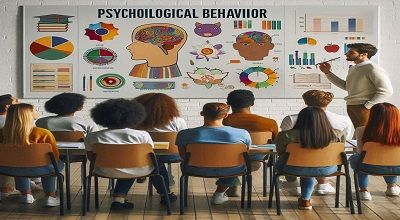Psychological Behavior in Education
Now here, Psychological behavior is a term that refers to the actions and reactions of humans and animals that can be observed and measured. Psychological behavior can be influenced by both internal and external factors, such as thoughts, emotions, genes, environment, learning, and reinforcement. Different branches of psychology have different approaches to studying and explaining psychological behavior.
For example, behavioral psychology, or behaviorism, is a theory that focuses on how the environment shapes human behavior through conditioning and reinforcement. According to behavioral psychology, behavior can be studied in a systematic and observable manner regardless of internal mental states. You can learn more about behavioral psychology from the web search results I found for you.
Psychological behavior in education
Psychological behavior in education is a very broad and complex topic that involves many factors and strategies. There is no single answer to how to affect psychological behavior in education, but some general principles and guidelines can be helpful.
Here are some possible ways to influence psychological behavior in education:
Behaviorism
Use behaviorism to shape and reinforce desired behaviors. Behaviorism is a theory that focuses on how the environment shapes human behavior through conditioning and reinforcement. According to behaviorism, behavior can be studied in a systematic and observable manner regardless of internal mental states.
Teachers can use behaviorism to improve teaching and increase learning by providing clear and consistent feedback, rewards, and consequences for students’ behaviors. For example, teachers can use praise, tokens, or grades to reinforce positive behaviors and use time-outs, loss of privileges, or reprimands to discourage negative behaviors.
Cognitivism
Use cognitivism to enhance and facilitate cognitive processes. Cognitivism is a theory that emphasizes the role of mental processes in learning and behavior. According to cognitivism, learning involves acquiring, storing, and retrieving information in the brain. Teachers can use cognitivism to enhance and facilitate cognitive processes by providing meaningful and organized information, activating prior knowledge, and using strategies.
Such as mnemonics, analogies, and examples to help students remember and understand the material. For example, teachers can use graphic organizers, outlines, or summaries to help students organize and integrate information, and use questions, quizzes, or discussions to help students recall and apply information.
Constructivism
Use constructivism to promote and support active and self-directed learning. Constructivism is a theory that views learning as a process of constructing meaning and knowledge from one’s own experiences and interactions with others. According to constructivism, learning is influenced by the learner’s prior knowledge, beliefs, and motivations. Teachers can use constructivism to promote and support active and self-directed learning by providing authentic.
Challenging tasks, facilitating collaborative and cooperative learning, and encouraging reflection and metacognition. For example, teachers can use project-based learning, problem-based learning, or inquiry-based learning to engage students in meaningful and relevant activities and use peer feedback, self-assessment, or portfolios to help students monitor and evaluate their own learning.
Experientialism
Use experientialism to foster and stimulate emotional and social development. Experientialism is a theory that emphasizes the importance of experience and emotion in learning and behavior. According to experientialism, learning involves feeling and doing, not just thinking and knowing. Teachers can use experientialism to foster and stimulate emotional and social development by providing opportunities for students to explore and express their feelings, values, and attitudes, and to interact.
Communicate with others in various contexts and situations. For example, teachers can use role-playing, simulations, or games to help students develop empathy, perspective-taking, and conflict-resolution skills, and use group work, community service, or field trips to help students develop social skills, civic responsibility, and cultural awareness.
Social Contextual Learning
Use social contextual learning to recognize and respond to the diversity and complexity of learners and learning environments. Social contextual learning is a theory that acknowledges the influence of social, cultural, and historical factors on learning and behavior. According to social contextual learning, learning is situated in a specific context and mediated by social interactions and cultural tools. Teachers can use social contextual learning to recognize and respond to diversity.
Complexity of learners and learning environments by adapting their instruction to the needs, interests, and backgrounds of their students, and by using various resources, technologies, and media to enhance and enrich their teaching and learning. For example, teachers can use differentiated instruction, multicultural education, or universal design for learning to accommodate and celebrate the differences among students and use computers, the internet, or multimedia to expand and diversify their sources of information and modes of expression.
